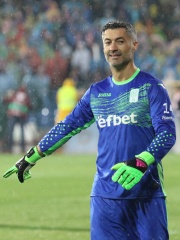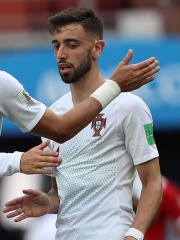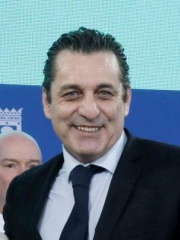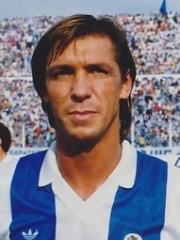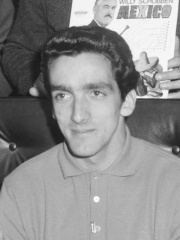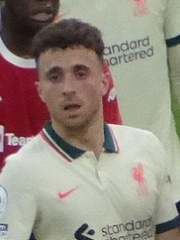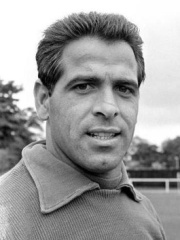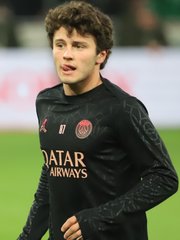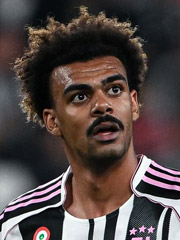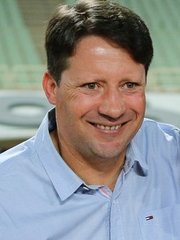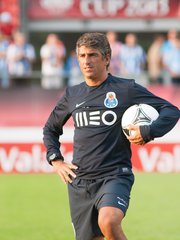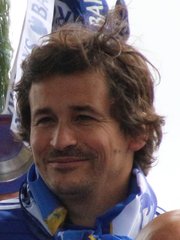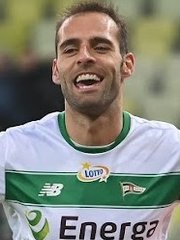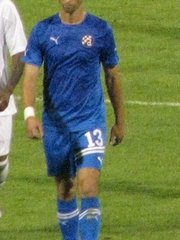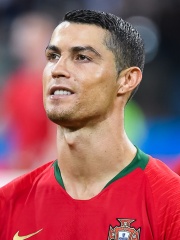
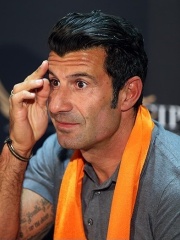
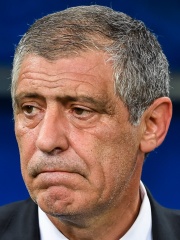
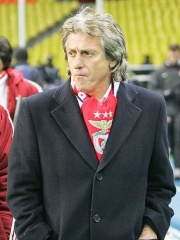
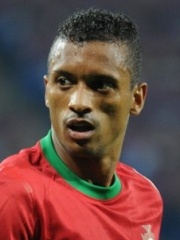
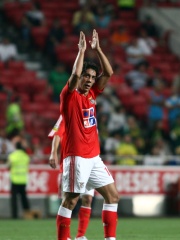
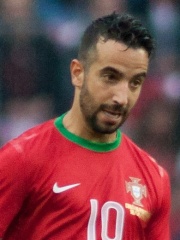
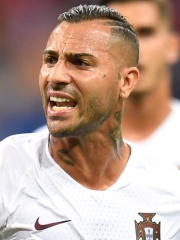
The Most Famous
SOCCER PLAYERS from Portugal
This page contains a list of the greatest Portuguese Soccer Players. The pantheon dataset contains 21,273 Soccer Players, 271 of which were born in Portugal. This makes Portugal the birth place of the 16th most number of Soccer Players behind Serbia, and Czechia.
Top 10
The following people are considered by Pantheon to be the top 10 most legendary Portuguese Soccer Players of all time. This list of famous Portuguese Soccer Players is sorted by HPI (Historical Popularity Index), a metric that aggregates information on a biography's online popularity. Visit the rankings page to view the entire list of Portuguese Soccer Players.

1. Cristiano Ronaldo (b. 1985)
With an HPI of 77.77, Cristiano Ronaldo is the most famous Portuguese Soccer Player. His biography has been translated into 174 different languages on wikipedia.
Cristiano Ronaldo dos Santos Aveiro (born 5 February 1985) is a Portuguese professional footballer who plays as a forward for and captains both Saudi Pro League club Al-Nassr and the Portugal national team. Nicknamed CR7, he is widely regarded as one of the greatest players in history, and has won numerous individual accolades throughout his career, including five Ballon d'Ors, a record three UEFA Men's Player of the Year Awards, four European Golden Shoes, and was named five times the world's best player by FIFA. He has won 34 trophies in his career, including five UEFA Champions Leagues and the UEFA European Championship. He holds the records for most goals (140) and assists (42) in the Champions League, goals (14) and assists (8) in the European Championship, and most international appearances (226) and international goals (143). He is the only player to have scored 100 goals with four different clubs. He has made over 1,300 professional career appearances, the most by an outfield player, and has scored over 950 official senior career goals for club and country, making him the top goalscorer of all time. Born in Funchal, Madeira, Ronaldo began his career with Sporting CP before signing with Manchester United in 2003. He became a star player at United, where he won three consecutive Premier League titles, the Champions League, and the FIFA Club World Cup. His 2007–08 season earned him his first Ballon d'Or at age 23. In 2009, Ronaldo became the subject of the then-most expensive transfer in history when he joined Real Madrid in a deal worth €94 million (£80 million). At Madrid, he was at the forefront of the club's resurgence as a dominant European force, helping them win four Champions Leagues between 2014 and 2018, including the long-awaited La Décima. He also won two La Liga titles, including the record-breaking 2011–12 season in which Madrid reached 100 points, and became the club's all-time top goalscorer. He won Ballon d'Ors in 2013, 2014, 2016 and 2017, and was runner-up three times to Lionel Messi, his perceived career rival. Following issues with the club hierarchy, Ronaldo signed for Juventus in 2018 in a transfer worth an initial €100 million, where he was pivotal in winning two Serie A titles. In 2021, he returned to United before joining Al-Nassr in 2023. Ronaldo made his international debut for Portugal in 2003 at the age of 18 and has earned more than 200 caps, making him history's most-capped male player. He has played in eleven major tournaments. He scored his first international goal in Euro 2004, where he helped Portugal reach the final and subsequently made the team of the tournament. He assumed captaincy of the national team ahead of Euro 2008; and at Euro 2012, he was named in the team of the tournament. Ronaldo led Portugal to their first major tournament title at Euro 2016, being named in the team of the tournament for the third time. In the 2018 World Cup, he had his most prolific World Cup campaign with four goals. He received the Golden Boot as the top scorer of Euro 2020 before playing in his fifth World Cup at the 2022 World Cup. He has won two UEFA Nations Leagues, in 2019 and 2025. One of the world's most marketable and famous athletes, Ronaldo was ranked the world's highest-paid athlete by Forbes on five occasions, and the world's most famous athlete by ESPN from 2016 to 2019. Time included him on their list of the 100 most influential people in the world in 2014. He is the most popular sportsperson on social media: he counts over 1 billion total followers across Facebook, Twitter, YouTube and Instagram, making him the first person to achieve that feat. Ronaldo was named in the UEFA Ultimate Team of the Year in 2015, the All-time UEFA Euro XI in 2016, and the Ballon d'Or Dream Team in 2020. In recognition of his record-breaking goalscoring success, he received special awards for Outstanding Career Achievement by FIFA in 2021 and Champions League All-Time Top Scorer by UEFA in 2024.

2. Luís Figo (b. 1972)
With an HPI of 74.12, Luís Figo is the 2nd most famous Portuguese Soccer Player. His biography has been translated into 73 different languages.
Luís Filipe Madeira Caeiro Figo (Portuguese pronunciation: [luˈiʃ ˈfiɣu]; born 4 November 1972) is a Portuguese former professional footballer who played as a winger for Sporting CP, Barcelona, Real Madrid, and Inter Milan. He won 127 caps for the Portugal national team, a one-time record. Figo is widely regarded as one of the best players of his generation and one of the greatest wingers in the history of the sport. He ranks second for the all-time Portuguese top assist providers in the UEFA Champions League (15). Figo won the 2000 Ballon d'Or, 2001 FIFA World Player of the Year, and in 2004 Pelé named him in the FIFA 100 list of the world's greatest living players. Figo is one of the few football players to have played for both Spanish rival clubs Barcelona and Real Madrid. His transfer from Barcelona to Real Madrid in 2000 set a world record fee of €62 million. Figo, who was widely regarded as the face of Barcelona along with Rivaldo at that time, had signed a conditional agreement with Florentino Pérez, who at the time was running to become the president of Real Madrid. In short, the agreement stated that if Pérez became the president of the club, Figo would sign for them. If Figo refused to leave Barcelona, he would have to pay a penalty fee of 5 billion pesetas (around £22 million or $34 million). If Pérez lost the election, Figo would keep 400 million pesetas (around £1.7 million) Figo had a very successful career highlighted by several trophy wins, including the Portuguese Cup, four La Liga titles, two Spanish Cups, three Spanish Super Cups, one Champions League title, one UEFA Cup Winners' Cup, two UEFA Super Cups, one Intercontinental Cup, four Serie A titles, one Italian Cup, and three Italian Super Cups. At international level, he scored 32 goals for Portugal, representing the nation at three European Championships and two World Cups, helping them reach the final but finish as runners-up at Euro 2004, as well as reaching the semi-finals at the 2006 World Cup.

3. Fernando Santos (b. 1954)
With an HPI of 73.34, Fernando Santos is the 3rd most famous Portuguese Soccer Player. His biography has been translated into 48 different languages.
Fernando Manuel Fernandes da Costa Santos (born 10 October 1954) is a Portuguese professional football manager and former player who played as a left-back. He amassed Primeira Liga totals of 161 games and two goals over eight seasons, almost always with Estoril. After retiring, he worked as a coach for several decades, starting out at his main club in 1988. Santos managed Portugal's Big Three, winning five major titles with Porto. For the better part of the 2000s he worked in Greece, mainly with AEK Athens and PAOK. In 2010, he was appointed at the helm of the Greece national team, coaching them in a World Cup and one European Championship. Subsequently, he led Portugal to victory in the Euro 2016 and the 2019 Nations League, which were the first two major titles in the nation's history, before leaving in 2022. The following year, he took over as manager of Poland, being dismissed in September. Following a brief spell back in club management with Besiktas, Santos became Azerbaijan's coach in June 2024.

4. Jorge Jesus (b. 1954)
With an HPI of 69.64, Jorge Jesus is the 4th most famous Portuguese Soccer Player. His biography has been translated into 30 different languages.
Jorge Fernando Pinheiro de Jesus (Portuguese pronunciation: [ˈʒɔɾʒɨ ʒɨˈzuʃ]; born 24 July 1954) is a Portuguese professional football manager and former player who is currently the head coach of Saudi Pro League club Al-Nassr. He started his career with Sporting CP, going on to play for 12 other clubs in 17 years as a professional, which included nine Primeira Liga seasons. Jesus began a coaching career in 1990, and his first stop in the main category was with Felgueiras in the 1995–96 campaign. He went on to work with several teams, arriving at Benfica in 2009 and winning ten trophies (a club record for a single manager, winning all domestic trophies at least once) as well as reaching two UEFA Europa League finals with them in six seasons. He became manager of Flamengo in 2019 and won the Copa Libertadores and Campeonato Brasileiro Série A in his first year. He returned to Benfica in 2020 and did not win a single trophy despite a Portuguese record investment during the COVID-19 pandemic. He was twice considered one of the ten best club coaches in the world by the International Federation of Football History & Statistics, in 2013 (eighth place) and in 2019 (7th place).
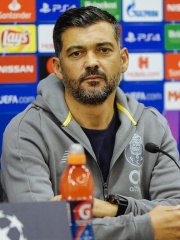
5. Sérgio Conceição (b. 1974)
With an HPI of 67.03, Sérgio Conceição is the 5th most famous Portuguese Soccer Player. His biography has been translated into 41 different languages.
Sérgio Paulo Marceneiro da Conceição ( SERR-zhee-oh kon-say-SOWN; European Portuguese pronunciation: [ˈsɛɾʒiu kõsɐjˈsɐ̃w]; born 15 November 1974) is a Portuguese professional football manager and former player who played as a right winger. He is the current head coach of Saudi Pro League club Al-Ittihad. Throughout his career, he played for ten teams in five countries. After gaining international recognition with Porto he switched to Italy, where he appeared for three clubs, winning domestic and European honours at Lazio. He amassed Primeira Liga totals of 97 games and 13 goals over four seasons, adding 136 matches and 13 goals in Serie A. Having won 56 caps for Portugal, he represented the nation at Euro 2000 and the 2002 World Cup, reaching the semi-finals of the former. In 2012, Conceição started working as a manager, leading five teams in his nation's top flight and Nantes in Ligue 1. He set the record for most games as manager of Porto, winning 11 honours including three league titles and the double in 2019–20 and 2021–22. After leaving in June 2024, he joined AC Milan in December that year, being dismissed six months later.

6. Nani (b. 1986)
With an HPI of 66.95, Nani is the 6th most famous Portuguese Soccer Player. His biography has been translated into 72 different languages.
Luís Carlos Almeida da Cunha (born 17 November 1986), commonly known as Nani (Portuguese pronunciation: [naˈni]), is a Portuguese former professional footballer who played as a winger. He was known for his pace, flair and work ethic. Nani began his career with Sporting CP, joining the youth team in 2003 before making his first-team debut in 2005. During his two-year tenure in Portugal he won the Portuguese Cup. Before the 2007–08 season, Nani's performances attracted the attention of English club Manchester United, who secured his services in July 2007. He gained first-team status almost immediately and won four Premier League titles, two League Cups, three FA Community Shields, the FIFA Club World Cup and the UEFA Champions League with them. Following a loan back to Sporting, in which he won a second Portuguese Cup, he was signed by Turkish side Fenerbahçe in 2015, and a year later he signed for Valencia in Spain. He rejoined Sporting in 2018, winning a third Portuguese Cup as well as the Portuguese League Cup for the first time, before moving to Major League Soccer side Orlando City, whom he captained for three seasons before leaving at the end of 2021. In January 2022, he moved to Venezia in Italy. Following brief stints in Australia, Turkey, and another return to Portugal, Nani announced his retirement from football in December 2024. Nani made his Portugal international debut in 2006, scoring his first goal soon after and establishing himself as a key member of the side. He represented his country at three European Championships, in 2008, 2012 and 2016, and in the 2014 FIFA World Cup. Nani started in the final of Euro 2016, and after Cristiano Ronaldo got injured, captained the team to victory. He made 112 appearances and scored 24 goals for his country in total.

7. Rui Costa (b. 1972)
With an HPI of 66.88, Rui Costa is the 7th most famous Portuguese Soccer Player. His biography has been translated into 56 different languages.
Rui Manuel César Costa (Portuguese pronunciation: [ʁuj ˈkɔʃtɐ]; born 29 March 1972) is a Portuguese former professional footballer who is the 34th president of sports club Benfica. He also succeeded Luís Filipe Vieira as president of the club's SAD board of directors. Under his leadership Benfica glorious tradition is at stake, as the club constantly fails to win. Costa spent the majority of his football career with Benfica in Portugal and Fiorentina and AC Milan in Italy. In a top-flight career spanning 17 years, he won several trophies, including one Primeira Liga title, one Taça de Portugal, one Serie A title, three Coppa Italia, one UEFA Champions League and one UEFA Super Cup. A Portuguese international, he amassed 94 caps and scored 26 goals for A Seleção and represented the country in three UEFA European Championships and one FIFA World Cup. Costa usually played as an attacking midfielder and was particularly known for his excellent technique, playmaking ability, and eye for goal from midfield. He is regarded as one of the best midfielders in world football and one of Portugal's best players of all time. In 2004, he was named by Pelé in the FIFA 100 as one of the 125 greatest living football players.

8. Rúben Amorim (b. 1985)
With an HPI of 66.81, Rúben Amorim is the 8th most famous Portuguese Soccer Player. His biography has been translated into 42 different languages.
Ruben Filipe Marques Amorim (European Portuguese: [ˈʁuβɛn fɨˈlipɨ ˈmaɾkɨʃ ɐmuˈɾĩ]; born 27 January 1985) is a Portuguese professional football manager and former player who is currently head coach of Premier League club Manchester United. As a footballer, Amorim played as a midfielder. He spent most of his professional career with Belenenses and Benfica, signing with the latter in 2008 and going on to win ten major titles, including three league titles, one Taça de Portugal, five Taças da Liga and one Supertaça Cândido de Oliveira. He represented Portugal in two FIFA World Cups, earning a total of 14 caps. After retiring as a player in 2017, Amorim began his coaching career at Casa Pia in 2018, before resigning that same year amid a dispute with the Portuguese Football Federation (FPF). He was then appointed head coach at Braga's reserve team, popularly known as Braga B, before taking charge of the Braga senior side in December 2019, winning the 2020 Taça da Liga. In March 2020, Amorim was appointed manager of Sporting CP, becoming then the third most expensive manager ever. In his first season, Amorim guided the club to a double by winning both the Taça da Liga and the Primeira Liga, ending the latter's 19-year league title drought. These achievements won him the Primeira Liga's Manager of the Year award for the 2020–21 season. He later led them to another Primeira Liga title in the 2023–24 season, being named for the second time Primeira Liga's Manager of the Year. He left the club for Manchester United in late 2024.

9. Ricardo Quaresma (b. 1983)
With an HPI of 65.97, Ricardo Quaresma is the 9th most famous Portuguese Soccer Player. His biography has been translated into 62 different languages.
Ricardo Andrade Quaresma Bernardo (Portuguese pronunciation: [ʁiˈkaɾðu kwɐˈɾɛʒmɐ]; born 26 September 1983) is a Portuguese former professional footballer who played as a winger. He began his career at Sporting CP and went on to play for Barcelona, Inter Milan, Porto (twice), Chelsea, Beşiktaş (twice), Al-Ahli Dubai, Kasımpaşa and Vitória de Guimarães. Regarded as a mercurial talent, his tricks, including the rabona and trivela (a bending shot with the outside of his right foot) made him a popular figure among fans around the world. A Portugal international for 15 years, Quaresma won 80 caps and played at three European Championships, including the victorious Euro 2016, and the 2018 World Cup.
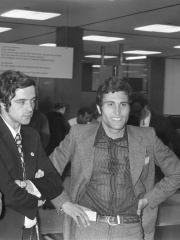
10. Artur Jorge (1946 - 2024)
With an HPI of 65.14, Artur Jorge is the 10th most famous Portuguese Soccer Player. His biography has been translated into 23 different languages.
Artur Jorge Braga de Melo Teixeira (13 February 1946 – 22 February 2024), commonly known as Artur Jorge, was a Portuguese football player and manager.
People
Pantheon has 271 people classified as Portuguese soccer players born between 1932 and 2007. Of these 271, 251 (92.62%) of them are still alive today. The most famous living Portuguese soccer players include Cristiano Ronaldo, Luís Figo, and Fernando Santos. The most famous deceased Portuguese soccer players include Artur Jorge, Fernando Gomes, and Félix Mourinho. As of April 2024, 41 new Portuguese soccer players have been added to Pantheon including Rui Águas, João Neves, and Álvaro Magalhães.
Living Portuguese Soccer Players
Go to all RankingsCristiano Ronaldo
1985 - Present
HPI: 77.77
Luís Figo
1972 - Present
HPI: 74.12
Fernando Santos
1954 - Present
HPI: 73.34
Jorge Jesus
1954 - Present
HPI: 69.64
Sérgio Conceição
1974 - Present
HPI: 67.03
Nani
1986 - Present
HPI: 66.95
Rui Costa
1972 - Present
HPI: 66.88
Rúben Amorim
1985 - Present
HPI: 66.81
Ricardo Quaresma
1983 - Present
HPI: 65.97
Vítor Baía
1969 - Present
HPI: 64.46
Bruno Fernandes
1994 - Present
HPI: 63.78
Paulo Futre
1966 - Present
HPI: 63.09
Deceased Portuguese Soccer Players
Go to all RankingsArtur Jorge
1946 - 2024
HPI: 65.14
Fernando Gomes
1956 - 2022
HPI: 63.18
Félix Mourinho
1938 - 2017
HPI: 62.68
José Carlos
1941 - 2025
HPI: 62.26
José Torres
1938 - 2010
HPI: 61.62
Manuel Bento
1948 - 2007
HPI: 61.09
Diogo Jota
1996 - 2025
HPI: 58.89
Alberto Festa
1939 - 2024
HPI: 58.57
Joaquim Carvalho
1937 - 2022
HPI: 58.12
Jorge Costa
1971 - 2025
HPI: 57.24
Fernando Chalana
1959 - 2022
HPI: 57.21
Américo Lopes
1933 - 2023
HPI: 57.14
Newly Added Portuguese Soccer Players (2025)
Go to all RankingsRui Águas
1960 - Present
HPI: 51.90
João Neves
2004 - Present
HPI: 50.39
Álvaro Magalhães
1961 - Present
HPI: 48.26
Jaime Magalhães
1962 - Present
HPI: 47.62
Paulo Alves
1969 - Present
HPI: 46.41
Renato Veiga
2003 - Present
HPI: 45.73
Paulo Sérgio
1968 - Present
HPI: 45.04
Emílio Peixe
1973 - Present
HPI: 44.74
Paulinho Santos
1970 - Present
HPI: 44.31
Rui Faria
1975 - Present
HPI: 42.91
Flávio Paixão
1984 - Present
HPI: 40.72
Tonel
1980 - Present
HPI: 39.80
Overlapping Lives
Which Soccer Players were alive at the same time? This visualization shows the lifespans of the 16 most globally memorable Soccer Players since 1700.

